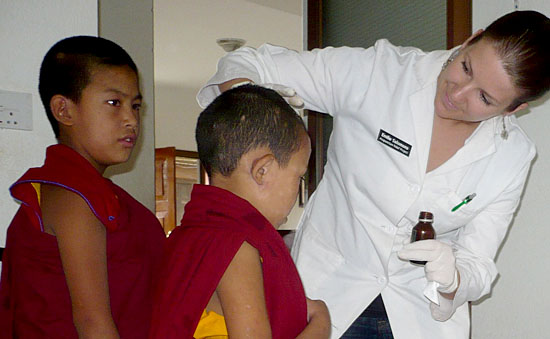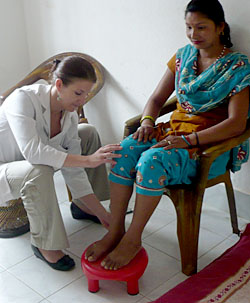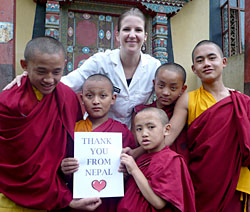
I arrived in Chapagaon, Nepal with two large bags overflowing with medical supplies. Appointed as the sole available doctor for the monsoon season in the ongoing rotation of health care practitioners organized by the Acupuncture Relief Project, which provides services at the Vajra Varahi Health Centre.
The Vajra Varahi Health Center has been open for two years now and offers a myriad of health services. These services are available for an optional 5 rupee donation (equivalent to around 7 cents), which allows the clinic to accept everyone and anyone who walks through its doors.
After hundreds of treatments I have had the opportunity to get a glimpse of the conditions the people of Nepal live with on a daily basis without consistent medical care and supervision. Although there are hospitals and basic primary care options available, in many cases not only is it too far to travel, but the cost of services deter many from seeking the assistance they so desperately need and deserve.
 I recall at one point begging an older gentleman to go to the hospital to seek treatment for what appeared to be the early stage of a second stroke. He was reluctant because not only were the treatment and diagnosis costs far out of his financial range, but the expense of the journey to the hospital alone, was too much for him. This scenario is not uncommon at the Vajra Varahi clinic, which acts as a primary health centre, a general care facility and unofficially, a triage for the hospital.
I recall at one point begging an older gentleman to go to the hospital to seek treatment for what appeared to be the early stage of a second stroke. He was reluctant because not only were the treatment and diagnosis costs far out of his financial range, but the expense of the journey to the hospital alone, was too much for him. This scenario is not uncommon at the Vajra Varahi clinic, which acts as a primary health centre, a general care facility and unofficially, a triage for the hospital.
Once the word got out that I was in town and open to treat patients, some people walked hours to get to the clinic to have their ailments looked at, others commuted considerable distances, staying with friends or distant relatives for weeks, leaving their families behind in order to receive their long overdue treatments. Ailments included paralysis, reoccurring seizures, extremely severe varicose veins, uncontrolled asthma, TB, severe rheumatoid arthritis, Bells Palsy, Parkinson’s, hernias, vaginal pro-lapse, malaria, un-abetting fever, dysentery, and a multitude of gastric complaints. Patients were incredibly thankful to have the clinic available to them and offered tokens of their appreciation continually despite my polite decline and explanation that it was my job and they needn’t give me anything.
 The other project I participated in while in Nepal was the training of eight HIV/addiction center staff in the “Five needle protocol” for substance withdrawal. The Sathi Samuha centre offers live in care for HIV positive clients and their families as well as detoxification services for substance abusers and a safe house for sex trade workers. They have three other facilities, which also offer out patient substance abuse prevention and harm reduction safe injection sites. The training went exceptionally well, as the center’s staff had been asking to be trained in the “Five needle protocol” for years and were excited to finally have a new tool to help with withdrawal symptoms, relapse prevention and program retention. The eight Sathi Samuha trainees were diligent students and learned the material very quickly. Finally armed with a cost effective tool to battle the growing problem of substance abuse, they finished the training excited and determined to help as many patients as they could.
The other project I participated in while in Nepal was the training of eight HIV/addiction center staff in the “Five needle protocol” for substance withdrawal. The Sathi Samuha centre offers live in care for HIV positive clients and their families as well as detoxification services for substance abusers and a safe house for sex trade workers. They have three other facilities, which also offer out patient substance abuse prevention and harm reduction safe injection sites. The training went exceptionally well, as the center’s staff had been asking to be trained in the “Five needle protocol” for years and were excited to finally have a new tool to help with withdrawal symptoms, relapse prevention and program retention. The eight Sathi Samuha trainees were diligent students and learned the material very quickly. Finally armed with a cost effective tool to battle the growing problem of substance abuse, they finished the training excited and determined to help as many patients as they could.
My final impression at the end of the journey is that the Acupuncture Relief Project, the Vajra Varahi Health Centre and the Sathi Samuha Centre are three honorable and genuinely effective programs serving the impoverished, disenfranchised Nepalese population. I feel incredibly privileged and grateful to have been a part of this project. –Emilie
Admin note: Dr. Emilie Salomons is now practicing at Acubalance Wellness Studio in Vancouver, British Columbia. We sincerely thank Emilie for her contributions and wish her success in her new practice.











